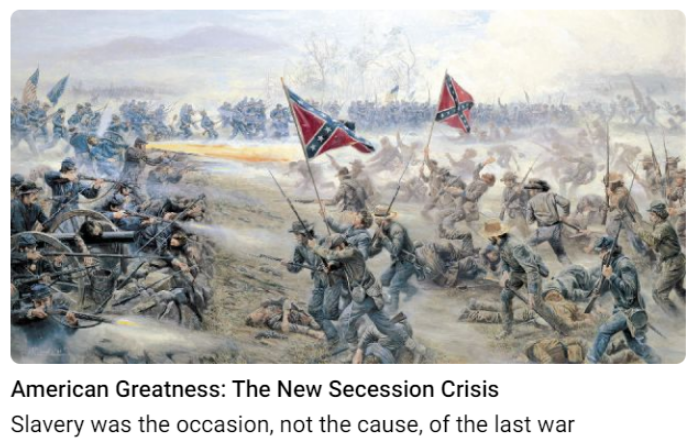Neo-Confederate Ideology
By: Zoe Manzi
_________________________________________________________________________________
Introduction
The term ‘neo-Confederate’ is often used to describe individuals or groups who hold beliefs or advocate for ideas that align with or resemble the ideology of the Confederate States of America (the Confederacy) leading up to, and during, the American Civil War. While this movement may lack a singular, cohesive identity, certain ideas and themes such as states’ rights, limited federal government involvement and a defensive view of the Confederacy persist amongst its adherents. This movement extends beyond structured organizations, encompassing decentralized networks, groups and unaffiliated individuals who share common traits including heritage preservation, resistance to civil rights advancement and, in some instances, overlaps with white supremacist ideologies. It is easy to question the relevance of an ideology rooted in a conflict that took place over 150 years ago. However, given the neo-Confederate participation in the deadly Unite the Right rally of 2017, alongside efforts by prominent political figures such as former President Donald Trump and 2024 US presidential candidate Nikki Haley to draw parallels between the American Civil War and contemporary politics, it is important to understand. The intricate mix of historical legacy, contemporary political discourse and economic and societal tensions that reflect the movement’s ideology is being introduced to a wider and more mainstream audience.
Historical Context
The outbreak of the Civil War in 1861 was fundamentally rooted in the issue of states’ rights versus the authority of the federal government, with slavery serving as the central flashpoint. The Confederate States seceded from the Union to protect their economic and social system which had been built upon the institution of slavery. The end of the conflict in 1865 resulted in a clear win for the Union and the abolition of slavery, but it also had a lasting impact on American society, shaping regional identities and political ideologies for generations to come. The post-war Reconstruction period (1865-77) was an initiative of the federal government to reorganize the Southern states and bring them back into the Union alongside a framework for African Americans and Whites to live alongside one another in a post-slavery society. This pivotal period saw the passing of the 13th, 14th and 15th amendments (the Reconstruction amendments) to the Constitution which respectively abolished slavery, guaranteed equal protection under the law, and granted all male citizens the right to vote regardless of race or former servitude.
Core Beliefs
At the core of the neo-Confederate movement is the championing of states’ rights, limited-to-no federal government involvement, and the preservation of Southern culture and identity. These core tenets, however, often mask a hidden underbelly which, at its most extreme, advocates for full secession from the United States, demands White racial purity, and views rebel bloodlines and rights to ancestors’ lands as sacred and non-negotiable. The amplification of these ideals has translated into anti-government, anti-migrant and racist rhetoric leading to the risk of elevated threats against the rights and movement of a non-white population.
States’ Rights and Limited Federal Government
Central to neo-Confederate ideology lies a profound distrust of centralized authority, particularly the federal government. Neo-Confederates staunchly advocate for states’ rights and limited federal government, viewing its interference in local laws, taxation and civic planning as infringements on individual liberties and states’ autonomy. They assert that the Confederate States fought for the right to govern themselves autonomously, resisting the intrusion of elected government officials who contested their right to maintain slavery. This advocacy extends to prioritizing state sovereignty over federal supremacy and pushing for greater states’ rights, especially regarding critical issues like education, healthcare and environmental policies.
Adherents often portray the Confederacy as a noble defender of states’ rights, shifting focus from the federal government’s necessary intervention in the 19th century to abolish slavery in Southern states – a primary driver of the Civil War. Consequently, this perspective often minimizes or disregards slavery’s pivotal role in the Confederate economy and society.

Figure 1: A meme from a neo-Confederate Telegram channel alluding to the right of the Confederacy to govern itself.
Neo-Confederates also staunchly uphold the right to limited government interference in private affairs. They contend that excessive government control suppresses personal autonomy and violates constitutional rights. This encompasses defending liberties such as free speech, gun ownership and property rights, which they perceive as under constant threat from an increasingly overreaching government.

Figure 2: A meme of a rebel soldier holding the Confederate battle flag posted in support of the Texas border protests at Eagle Pass.

Figure 3: Representation of a ‘rebel’ (Confederate) soldier holding the Confederate battle and Southern Nationalist flags.
Heritage and Identity
Neo-Confederates often maintain that their actions are driven by a commitment to safeguard Southern heritage and cultural identity. This preservation effort encompasses the celebration of Confederate symbols, notably the Confederate battle flag, the defense and protection of statues representing historical Confederate figures, and the propagation of a selective interpretation of Southern history.
Further along this continuum, the concept of ‘bloodlines’ is of paramount importance in the neo-Confederate community and assumes a fundamental role in defining heritage, identity, and perceived cultural continuity. The fixation on bloodlines often stems from a distorted interpretation of ancestry, reinforcing a belief in a distinct racial or ethnic identity integral to the neo-Confederate narrative. This emphasis on blood ties to the Confederate cause contributes significantly to the movement’s ideology.

Figure 4: Neo-Confederate adherents standing in front of the word ‘LOVE’ crafted with the Confederate battle flag.
Symbolic Importance
Within neo-Confederate discourse, bloodlines hold symbolic significance, symbolizing a connection to the past and a steadfast commitment to preserving a unique way of life. This symbolism extends to Confederate symbols like flags and monuments, which serve as representations of shared bloodlines and cultural identity. Some adherents may assert ownership of land as a testament to familial ties dating back to the Civil War, viewing it as a cornerstone of their heritage and birthright. While not all Confederate soldiers owned much land, modern day supporters of the Confederacy, regardless of their views on race, often feel proud to own land that has been passed down through generations. They believe this connection to the land represents the essence of the South and helps bridge the historical gap between landholders and impoverished Southerners who fought in the war. This belief in bloodline preservation may at times overlap with racist views and resistance to demographic shifts.

Figure 5 (left): An image from a neo-Confederate Telegram channel reinforcing the notion that bloodlines are inherently linked to land ownership.
Figure 6 (right): Reinforcing the message that without secession, the entire USA will become a ‘permissive, debauched and racially mixed’ California.
Cultural Continuity
The notion of bloodlines is further interwoven with the preservation of perceived Southern cultural heritage. Adherents maintain that certain cultural attributes, values and traditions are exclusively inherited through bloodlines and that only those with Confederate ancestors can truly understand and relate to a ‘Southern’ way of life. This perspective fosters resistance to social and cultural changes, framing them as existential threats to the continuity of a treasured heritage.

Figure 7: The Southern Family is described as having unique qualities going back generations and must be defended.

Figure 8: ”Self-determination runs in our blood.”
Cultural Preservation
Neo-Confederates are deeply committed to safeguarding what they perceive as Southern heritage and traditions. This includes defending symbols like the Confederate battle flag and monuments honoring Confederate figures, as well as promoting a romanticized version of the antebellum South which supports the ‘traditional’ family and regressive gender roles. This dedication to cultural preservation manifests in various forms, from public displays of Confederate imagery to advocacy against initiatives perceived as eroding Southern identity.

Figure 9 (left): A neo-Confederate on guard duty at a Confederate monument. Figure 10 (right): Cultural preservation is an essential part of neo-Confederate ideology.

Figure 11: A return to the romanticized version of the antebellum South with old-fashioned values as opposed to the ‘degenerate’ society fostered by the ‘US Empire.’
White Supremacy, Racial Purity and Identity
Neo-Confederate beliefs often intersect with white supremacist ideologies, albeit not universally across all adherents. While groups like the Sons of Confederate Veterans, SCV primarily focuses on heritage and ancestry, other individuals and groups within the neo-Confederate movement espouse white supremacist views. These ideologies often center around notions of racial superiority and the preservation of ‘Anglo Celtic’ identity, which they believe is threatened by multiculturalism and immigration. Returning to a key concept, bloodlines are often used to reinforce ideas of racial purity, serving to distinguish the neo-Confederate community from what they may perceive as outside threats or adversaries with a different ethnic background. Anti-migrant sentiment is increasingly becoming an issue, with some blaming the federal government for allowing immigration that they believe will threaten Southern culture and heritage.

Figure 12 (left): A post in a neo-Confederate channel claimed that the US government’s Diversity, Equity and Inclusion’ program (DEI) should be repurposed as ‘DIE’ while implying it will negatively impact white people.
Figure 13 (right): Meme demonstrating the claim that the Confederate battle flag is the only real patriotic flag given the actions of the US federal government.
Opposition to Civil Rights Advances
In some cases, neo-Confederates may resist or oppose advancements in civil rights, arguing that these changes infringe upon their perceived Southern way of life. This opposition may manifest in various forms, including resistance to demographic shifts through anti-migrant sentiment and calling for stricter immigration policies, particularly from non-white countries. This view often extends to rejecting policies aimed at addressing systemic racism and inequality, framing this as federal government interference. Alongside an anti-migrant position, elements of white supremacy and anti-LGBTQ+ sentiments may further fuel opposition to progress in civil rights, highlighting a complex intersection of historical narratives, cultural identity and social justice within the neo-Confederate movement.

Figures 14: A post describing how the South will continue to be betrayed by the North by prioritizing non-whites under the guise of the ‘Civil Rights Act.’

Figure 15: Post about how President Biden is supposedly attempting to force a demographic shift to gain votes.
Historical Revisionism
The focus on bloodlines can also be tied to historical revisionism— the reinterpretation of historical events— which is prevalent in neo-Confederate culture. By emphasizing a specific racial or ethnic identity, adherents may downplay or selectively interpret historical events, particularly those related to the institution of slavery. Instead, they may emphasize states’ rights or economic factors as primary reasons for secession, portraying the Confederacy as fighting to defend noble causes rather than to preserve the institution of slavery. By distorting historical facts, proponents of neo-Confederate ideology aim to justify their continued honoring of Confederate symbols and ideologies while whitewashing the atrocities of slavery.

Figure 16: A post claiming that slavery was not the cause of the American Civil War.
Real-World Harm
Several incidents involving members of the self-identifying neo-Confederate hate group League of the South (LOS) in 2017 underscore the group’s involvement in criminal activities and real-world harm. One of the most egregious incidents occurred during the 2017 ‘Unite the Right’ (UTR) rally in Charlottesville, Virginia, where a member of the LOS viciously attacked a 20-year-old African American man in a parking lot. The perpetrator, who was convicted of malicious wounding, was among several individuals associated with the LOS arrested in connection to the rally. Another member from Florida was found guilty of carrying a concealed handgun at the UTR rally and received a suspended jail sentence and fine. Outside of the UTR rally, an Alabama LOS member faced charges of disorderly conduct following an altercation at a speech by white nationalist Richard Spencer at Auburn University. Similarly, a fellow member also from Florida was involved in multiple incidents, including an altercation at a pro-Confederate monument rally in New Orleans and a protest outside the City Hall in Hollywood, Florida. He pled guilty to aggravated assault in the latter case and was placed on probation. These arrests and convictions highlight the involvement of LOS members in violent and disruptive behavior, demonstrating the group’s propensity for criminal activity and its impact on communities where they operate.
Conclusion
The ideology of the neo-Confederate movement represents a multifaceted blend of opposition to civil rights progress, distrust of the federal government, white supremacist beliefs, and historical revisionism. While adherents may frame their views as rooted in states’ rights and ancestral heritage, the movement’s glorification of Confederate symbols and their attempts to rewrite history obscure the realities of slavery and systemic racism. By perpetuating distorted narratives of the Civil War and advocating for a belief system that upholds racial hierarchy, the significance of the neo-Confederate movement in the United States, particularly during an election year, is worthy of attention.
At its most extreme, the neo-Confederate world view can contribute to significant real-world harm. As discussed, the League of the South was found to have played a central role in the notorious UTR rally in 2017. Along with various far-right extremist groups, including factions of white nationalists and neo-Nazis, LOS’s involvement began ostensibly as a gathering, under the guise of historical preservation, to defend a Confederate monument and protest its imminent removal. However, the rally quickly escalated into what has now been determined to be organized racially motivated violence, with participants wielding torches and chanting white supremacist slogans. Amidst clashes between opposing sides, chaos erupted leading to injuries and the murder of counter-protester Heather Heyer. Following this event, the League of the South found itself alongside several other groups, embroiled in a lawsuit which highlighted the dangers posed by such extremist groups and their propensity to incite violence and hate under the veneer of heritage and cultural preservation.

Figure 17: Neo-Confederates admired by their compatriots for fighting for ‘blood and soil’ during the Unite the Right rally.
Further Reading:
The Martin Luther King, Jr. Research and Education Institute (stanford.edu)
Horwitz, Tony. Confederates in the Attic: Dispatches from the Unfinished Civil War. New York, Vintage Books, 1999.
_________________________________________________________________________________
This Explainer was uploaded on 1 March 2024.



